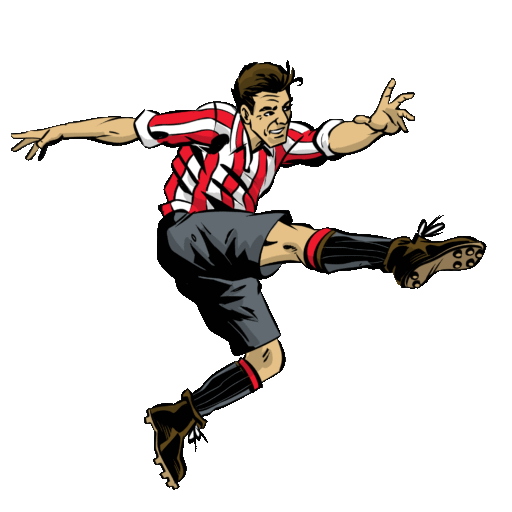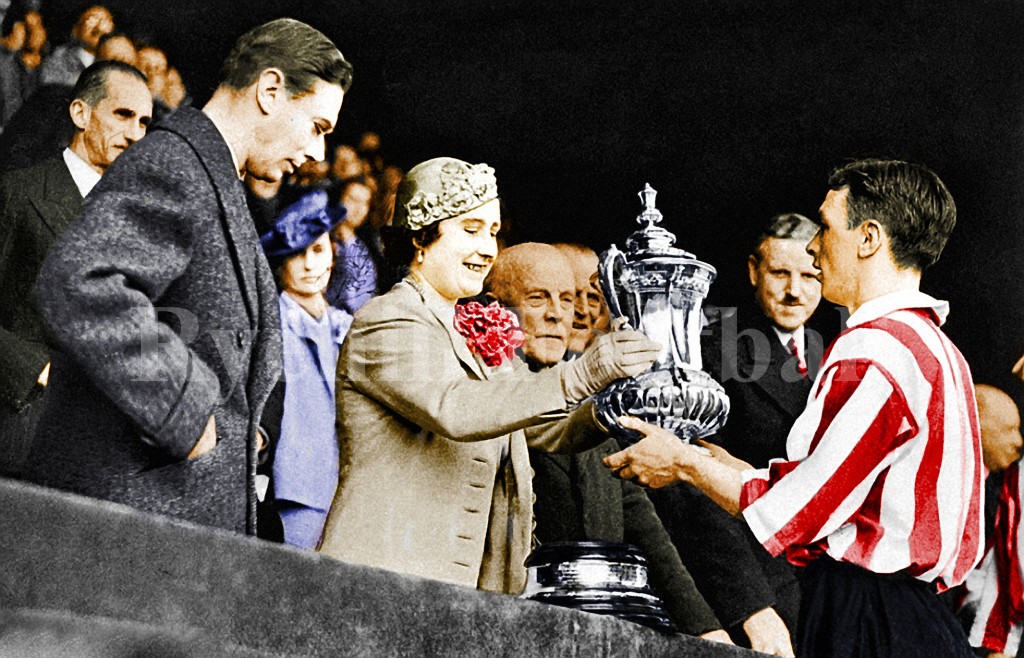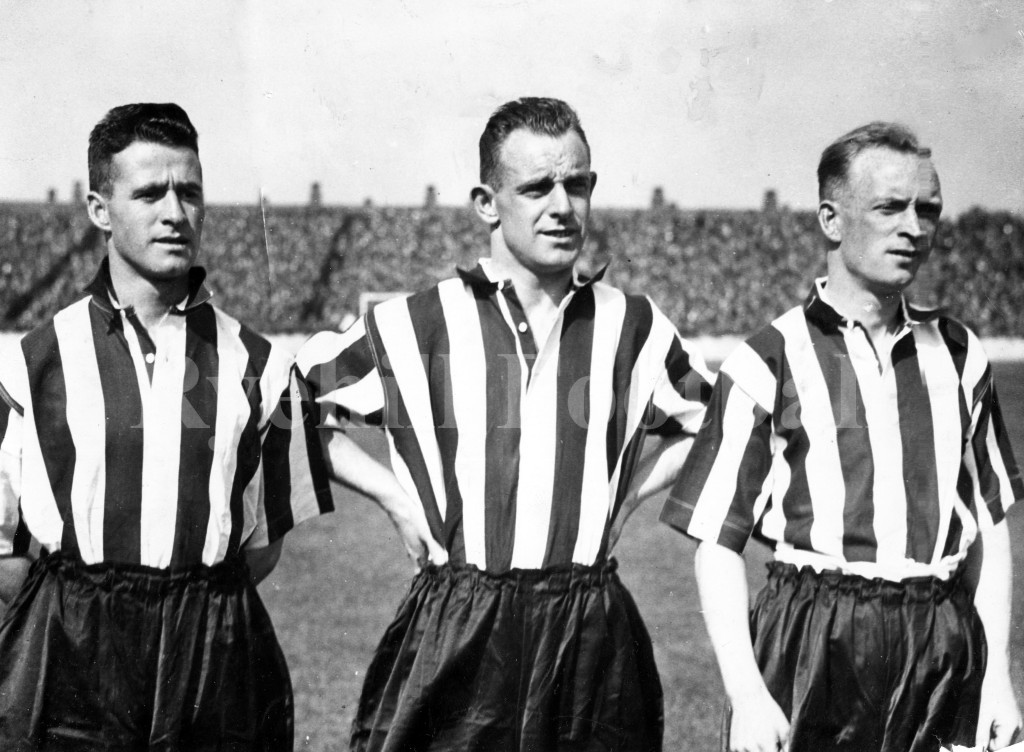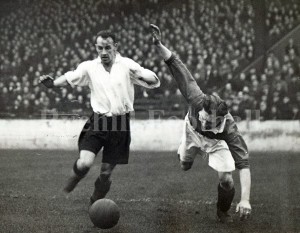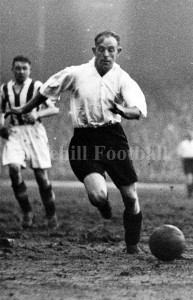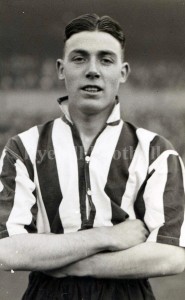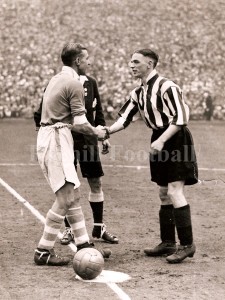Up For The Cup,
The Story Of Sunderland AFC’s 1937 FA Cup Triumph
The Holy Grail, Carter Gets The Cup From The Queen
Introduction
Since the clubs formation in 1880 League championships had been frequently come by but FA Cup wins were non existent. This led to that competition being the Holy Grail for fans of The Black Cats. Of course we had reached the final in 1913 only to succumb to defeat by Aston Villa. However in 1937 the club achieved its ambition. This is the story, as told through the match reports, and images, of how SAFC finally won the FA Cup.
The Matches
Gallacher (left) and Gurney (middle) both scored against Southampton
FA Cup 3rd Round, 16 January 1937, Southampton 2 vs. 3 Sunderland
Southampton Scorers: Holt 70, Summers 80
Sunderland Scorers: Gurney 5, Hornby 24, Gallacher 65
Attendance 30,280
Events proved it was a wise decision to play a 100% fit Hornby rather than a 50% Carter in this cup tie. While Hornby faded in the last 20 minutes he had by then earned his place apart from the goal he scored. One could not really see Sunderland losing this game so far ahead were they in football skill but it is no credit to their defence that they lost 2 goals in the last 20 minutes of the game. The trouble was that Collins playing a fine first half could not stand up to the game later on and fell too often as he turned on the bad surface. He weakened perceptibly.
Southampton lacked Sunderland’s subtle craft at wing half and at inside forward. If they had had a Gallacher they might have forced a replay. Gallacher was the forward of the game. His courage in a tackle, his dribbling and shooting were something way ahead of what he has been showing recently. He was international class. The Wearsiders flank men were the weakest of the line but they were operating on the worst part of a very waterlogged pitch. Duns showed improvement which was to be expected when he moved into the middle.
Apart from flashes from Summers and Smallwood, Jimmy Dunne had a better standard of ability than anyone else in the home side. His bad luck lay in the fact that Johnston was on the top of his form. Southampton were just an average 2nd division side without any outstanding merit in defence. But they play scrupulously fair football and with both teams in this frame of mind it was a pleasant enough game to watch. Sunderland were a couple of goals to the good at the interval and by that time the record crowd of 30,280 had abandoned hope.
Gurney got the first from Gallacher’s pass and Hornby hit the 2nd but neither of these goals quite compared with the 3rd in the way it was schemed. It was Gallacher who put the ball into the net but it was Gurney who made it by holding the ball until the defence got out of position and a perfect through pass left Gallacher with only the goalkeeper to beat. Holt and Summers got Southampton’s goals and there were made all the easier by mistakes and slips by the left side of the Sunderland defence.
Southampton: Scriven, Sillett, Roberts, King, Henderson, Kingdom, Summers, Neal, Dunne, Holt, Smallwood
Sunderland: Mapson, Hall, Collins, Thomson, Johnston, McNab, Duns, Hornby, Gurney, Gallacher, Connor
FA Cup 4rth Round, 30 January 1937, Luton Town 2 vs. 2 Sunderland
Luton Town Scorers: Roberts 25, 30
Sunderland Scorers: Connor 60, Duns 67
Attendance 20,134
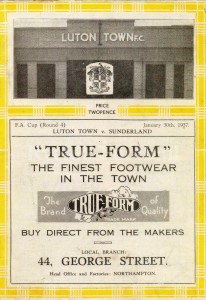 Some people say you need luck to win the cup. If Sunderland have as much luck henceforth as they did in this game they are going to break a bogey and give lie to that often respected statement made by the late Johnny Campbell in the early 1890’s that Sunderland would never win the cup. Its no exaggeration when its stated that Luton should have had 4 or 5 goals before Sunderland looked like getting one. Sunderland never started to play until the last half hour. Mapson should be excluded from that remark together with Johnston. They had been the Wearsiders rock up to then. Yet even they could not have prevented goals if Luton’s shooting had been better.
Some people say you need luck to win the cup. If Sunderland have as much luck henceforth as they did in this game they are going to break a bogey and give lie to that often respected statement made by the late Johnny Campbell in the early 1890’s that Sunderland would never win the cup. Its no exaggeration when its stated that Luton should have had 4 or 5 goals before Sunderland looked like getting one. Sunderland never started to play until the last half hour. Mapson should be excluded from that remark together with Johnston. They had been the Wearsiders rock up to then. Yet even they could not have prevented goals if Luton’s shooting had been better.
The cast iron ground put fear into the hearts of the Sunderland players just like Port Vale did last year. Luton thought nothing of it and if they went in for the ball there was no risk as the Sunderland players were holding back. The result and this is no exaggeration, was that Sunderland were shown up by a 3rd division side for nearly 55 minutes of the game. That was until the rain which had began to fall had soaked the top inch or two and suddenly Sunderland burst into life. They began to hold the ball, draw a man out of position and Luton’s dashing defence which up to that time had hit everything and anything began to crumble.
Yet Sunderland still had the luck. It was a blunder by Dolman that gave them an equaliser and a bad miss by record breaker Payne 2 minutes from the end almost saved a replay. Under such conditions one should not criticise the Sunderland players other than saying one expected more pluck on the hard going than was exhibited. Up to the moment of recovery Gorman was so lost by the new type of defensive game he is experiencing that the defence has not been improved one iota, rather it is weakened. Luton are not a great football side but they are big hearted and quick to shoot. They fought to a man and deserve praise for that. They were the more dangerous side for longer than Sunderland were.
It appeared the poor defensive work of Sunderland enabled Roberts, anything but a good player, to score his 2 first half goals. The 2nd was disputed but the referee stuck to his decision after consulting a linesman. It was Connor who reduced the lead after Gurney sent the ball across to him and it was Connor who sent over the high centre which caused Dolman to blunder by trying to hold a ball that was out of his reach. Duns was lying handy and the ball finished in the net. The attendance was 20,134 and at double prices the receipts were up to £2,825.
Luton Town: Dolman, McKay, Smith, Finlayson, Nelson, Fellows, Hodge, Sloan, Payne, Roberts, Stevenson
Sunderland: Mapson, Gorman, Hall, Thomson, Johnston, McNab, Duns, Carter, Gurney, Gallacher, Connor
FA Cup 4rth Round Replay, 3 February 1937
Sunderland 3 vs. 1 Luton Town
Sunderland Scorers: Duns 3, Connor 18, Carter 87
Luton Town Scorer: Payne 6
Attendance 53,235
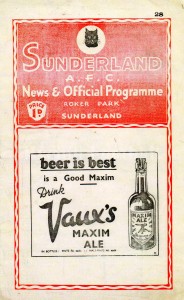 Conditions were in favour of Sunderland. Superior football ability, little wind, a soft pitch which was in perfect order before it cut up a little and when the Champions took the lead in 5 minutes the spectators expected them to make the game safe early on. Instead they saw Luton fight back to equalise 2 minutes later and make a great fight of it to the interval. Sunderland did manage to get the lead in 17 minutes but they only just hung on to it and in the 2nd half Luton looked like getting on level terms again.
Conditions were in favour of Sunderland. Superior football ability, little wind, a soft pitch which was in perfect order before it cut up a little and when the Champions took the lead in 5 minutes the spectators expected them to make the game safe early on. Instead they saw Luton fight back to equalise 2 minutes later and make a great fight of it to the interval. Sunderland did manage to get the lead in 17 minutes but they only just hung on to it and in the 2nd half Luton looked like getting on level terms again.
Sunderland dominated play in the last 30 minutes during which time they should have scored 3 times or more but failed to make full use of the obvious scoring chances and it was not until the 87th min they got a 3rd goal to settle the issue. After a fast 1st half with plenty of incident in it Luton did not keep up their attacking work and with both sides tiring on the heavy ground there was a lot of aimless kicking with little constructive football and method.
Actually Luton gave the impression they were leading not the Wearsiders for the inside forwards hung back and Payne at centre forward was given no support whatever. Whether they wanted to keep Sunderland’s advantage to only one goal one cannot say but for ma team with a cup reputation and nothing to lose they did not adopt the best tactics. Instead of all out attack they played a semi-defensive game relying on quick bursts by the wingers and a shot by Payne.
In the 1st half Luton made good use of Stevenson their fast outside left who appeared to have the beating of the Sunderland defence in the first half hour and when they did feed him in the 2nd half it was with the wrong pass, too square. Payne unsupported could not get through on his own against Johnston and the backs. During the 2nd half Gorman had settled down after an uncertain start and Luton’s tactics allowed him to get to Stevenson who needs long running passes to use his pace.
Sunderland were the better craftsmen and worked the ball skilfully on the ground yet the attack was not at its best. Carter has had better games and the wing men were inclined to take the ball too far in. On top of this shooting was often too hurried otherwise Duns could have had 3 goals instead of 1. Gurneys chief asset, persistency, was not only helpful but made the last goal. Gallacher stood out as the best forward on the field for skill and actual work and he had a splendid helper behind him in McNab. Thomson was constructive but the Wearsiders positional play in defence was bad for the first 20 minutes lacking in understanding between half and full backs.
This was remedied but a more skilful side would have done more damage before the gap was closed. Gorman on his play in the last 40 minutes suggested he will be a sound and dependable member of the side after a couple of more games to get into the Wearsiders methods. Mapson gave a sound display in goal more so than his opposite number Dolman who had more work to do of course but was fortunate to be beaten only 3 times. Twice a defender on the line prevented the ball going into the net.
Luton were strong in defence on the right side especially at wing half and Roberts was there most constructive inside forward. Payne would get a lot of goals in a first division attack. He can distribute the ball and requires little shooting room. The visitors played a sporting game and Nelson was unlucky to have some decisions go against him, due maybe to his build. The referee however missed some that one would expect in a game of this type and a penalty to each side might have been awarded especially when Luton player was tripped in the home penalty area before the interval. A second equaliser then would have made a big difference.
Sunderland’s 1st goal was scored by Duns who was lying near the far post when the goalkeeper failed to fist away a McNab free kick Payne’s response a couple of minutes later came from Rich’s cross and a flashing shot from the centre forward. Another cross this time by Duns produced a goal when Connor ran in with a defender crowding him to shoot a fine goal. It was 70 more minutes before Carter got the final goal with a rasping left foot shot after Gurney had made the chance.
Sunderland: Mapson, Gorman, Hall, Thomson, Johnston, McNab, Duns, Carter, Gurney, Gallacher, Connor
Luton Town: Dolman, McKay, Smith, Finlayson, Nelson, Fellows, Rich, Sloan, Payne, Roberts, Stevenson
FA Cup 5th Round, 20 February 1937, Sunderland 3 vs. 0 Swansea Town
Sunderland Scorers: Gurney 51, Duns 80 (pictured below), Caldwell (OG) 89
Attendance 48,500
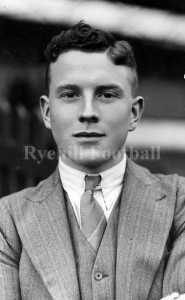 The crowd of 48,500 found Sunderland’s cup tie an unexciting affair for the most part. Seldom did the football rise to any great heights and though Sunderland won comfortably enough by 3-0 they never showed form which stamped them as eventual cup winners. The wind was responsible for most of the poor play though nerves and anxiety contributed. Sunderland were a poor side against the wind but even then they had a slight territorial advantage Both sides found it difficult to control the ball often putting it high into the air. The Wearsiders had chances in the 1st half but their shooting was hasty and ill directed.
The crowd of 48,500 found Sunderland’s cup tie an unexciting affair for the most part. Seldom did the football rise to any great heights and though Sunderland won comfortably enough by 3-0 they never showed form which stamped them as eventual cup winners. The wind was responsible for most of the poor play though nerves and anxiety contributed. Sunderland were a poor side against the wind but even then they had a slight territorial advantage Both sides found it difficult to control the ball often putting it high into the air. The Wearsiders had chances in the 1st half but their shooting was hasty and ill directed.
Most of the chances came to Carter but he could not get his shots right. Moore in the Swansea goal distinguished himself with some fine fielding of high balls and his two backs were more than useful in holding up the home forwards. It was not until Sunderland got their 1st goal that the best was seen of the home forwards. Then they applied some heavy pressure which found chinks in the visiting defence. All 3 goals came from the left wing. Gallacher darted through to make a shrewd pass for Gurney to turn the ball into the net off a defenders foot. Ten minutes from the end Burbanks placed a corner kick for Duns to send in a flying header that gave Moore no chance.
Then with the last move of the game Burbanks got clear away and shot. The ball was almost in the net when Caldwell stuck out a foot in a vain attempt to clear and the ball went under the bar with Moore again helpless. So Swansea went out of the competition. They were never a class side on this form but occasionally their forwards moved nicely in the open and the defenders knew how to cover each other. Williams made the best shot of the 1st half when he skimmed the bar with a fine long drive. For the rest however Mapson never really had a testing shot to deal with, his work consisting chiefly of taking back passes and centres.
Clarke was not too happy on his return to the Sunderland side yet Brain seldom got the better of him. Generally the inside forward work of the visitors was poor. The wingers however were a lively progressive pair and better inside men would have taken advantage of their work. Sunderland’s defence had a scrambling 1st half when their judgement of the ball in the wind was poor. Playing with the wind however they made few mistakes. Thomson and McNab indulged in some good forcing work in the 2nd half when the team as a whole were well on top.
Gurney was up against a tough centre half in Leyland but like Carter and Gallacher he was always working hard to keep the line moving. Burbanks and Duns took most of the honours in attack. The attendance of 48,500 brought receipts of £2913.
Sunderland: Mapson, Gorman, Hall, Thomson, Clarke, McNab, Duns, Carter, Gurney, Gallacher, Burbanks
Swansea Town: Moore, Lawrence, Caldwell, Harris, Leyland, Lloyd, Lewis, Warner, Brain, Williams, Lowrie
Burbanks (in white) played well against Wolves
FA Cup 6th Round, 6 March 1937, Wolves 1 vs. 1 Sunderland
Wolves Scorer: Jones 37
Sunderland Scorer: Duns 70
Referee Mr Twist Attendance 57,751
What a game! What a ground! It is said Wolves make their ground to suit their players. They must have taken up the drainage system this time. It was the worst pitch seen for years. Sunderland ought to have been in the semi-final draw and probably would have been had the ground been drier or had a glaring penalty been awarded to them. The only person in the ground who had the slightest doubt that it was a penalty when Gallacher was tripped and pushed, and that includes Wolverhampton people, was the referee. Mr Twist was back on the halfway line and unable to make progress in the mud when the incident happened.
That was what held Sunderland up, the sea of mud. One never saw any of the much vaunted wonderful football skill with which Wolves have been credited. They had the youth and the strength to hit the heavy ball and the speed to create difficult positions when they did hit it but their youth did not make them last longer than Sunderland. In fact the visitors were the better side in the 2nd half but luck was against them. The mud slowed down both the Wearsiders and the ball when their football created openings and prevented positions from which it would have been impossible to recover developing. On such a ground they were unlucky not to win and certainly deserved the replay.
As anticipated Sunderland altered their game for 45 minutes. They concentrated not on defence but on consolidating that defence by the halfbacks refraining from going too far upfield so as to get back quickly into a covering position. They were a goal behind at the interval through a shot from Bryn Jones hitting Thomson’s shoulder in a crowd of players and going away from Mapson. Naturally the visitors attack had not the same opportunities with the halfbacks hanging back but a goal behind they had to go forward after the interval and the Wolves defence was gradually worn down. A great goal by Duns in which he was helped by Gurney and a replay was the result.
How they fought! The Wolves inside forwards dropped back and the home side went out of the game as an attacking force. Sunderland schemed and drew the defence out of position but it was so hard to dribble the ball through the mud the defence was able to get back and tackle again. There were thrills in the last minutes. Burbanks put in a curling centre with his right foot and Gallacher missed it by a fraction as he went headlong into the net. The ball travelled on and Gold’s fingers turned it off the head of Duns. Then Ashall took a corner at the Sunderland end and it glanced off Johnston’s head to Wharton who shot a foot wide to a huge sigh of relief from the Wearsiders.
There were 11 men in the Sunderland team all pulling their weight. All deserve praise. The backs were steady; Johnston was resolute in facing Clayton and the wing halves and forwards did neat work. But McNab was the star. He has never played better and where he got the reserves of energy from one is left guessing. He was magnificent and so was Gallacher in the 2nd half. The Wolves attack was disappointing from a home point of view. Whether the game was too big for them one cannot say. Smalley and Ashall failed. Jones as the great schemer was the man with the big match temperament – the rest were good fighters.
Wolverhampton: Gold, Morris, Taylor, Wharton, Cullis, Gardner, Smalley, Galley, Clayton, Jones, Ashall
Sunderland: Mapson, Gorman, Hall, Thomson, Johnston, McNab, Duns, Carter, Gurney, Gallacher, Burbanks
Bobby Gurney scored a last gasp equaliser against Wolves
FA Cup 6th Round Replay, 10 March 1937, Sunderland 2 vs. 2 Wolves
Sunderland Scorer: Gurney 90, Duns 95
Wolves Scorer: Galley 86, Thompson 97
Referee Mr Twist Attendance 61,796
Over 60.000 spectators were resigned to what seemed to be the inevitable dismissal of Sunderland from the FA cup at 4.36 pm with the visitors a goal ahead. You could almost hear a pin drop but a sudden roar split the air, Gurney had done the unexpected. He had scored and Sunderland were able to go at Wolves. Extra time was necessary. Did I say Gurney had done the unexpected. Nothing is unexpected where Gurney is concerned. A die hard and last ditcher if ever there was one. The goal gave Sunderland new life and new resolution.
Extra time was only 5 minutes old when Sunderland went ahead. How near Wembley looked but how quickly it was gone. Two minutes later the scores were level again and so they remained until the end. Thus after 210 minutes of ding dong fluctuating football the teams have to meet again at Hillsborough. One should not indulge in criticism but the fact that Duns missed two gilt edged chances, one in each half before the visitors scored simply must be placed on record. Duns however got Sunderland’s 2nd goal so atoned in part for his earlier lapses. Taking the game in its entirety however one could not blame the home attack for failing against the Wolves.
Bad back play gave the visitors two goals and Gorman was the most guilty individual on both sides. He was considerably below his form of the first game. The gates were closed half an hour before kick off though the attendance of 61,796 was well short of the ground record but Sunderland were determined that gate crashing should be eliminated. The receipts were £3787. The football was keen, fast and determined throughout but it lacked the subtlety of the average First division game. In fact it was very mediocre until late on when Wolves got their 1st goal. Then and not until then did play develop along classic lines.
All the thrills or most of them came in the tail of the 120 minute battle. The scoring timetable was as follows:- Galley 86 minutes, Gurney 891/2 minutes, Duns 95 minutes and Thompson 97 minutes. In the remaining 23 minutes the visitors’ goal had several narrow escapes. The Wearsiders played as well then as then had at any time during the game, a tribute to their physical condition. The outstanding incidents in the 1st half were two very fine saves by the visiting goalkeeper Gold from Carter. In the first he flung himself at Carters feet to smother the ball and was injured. Then a minute before the interval Duns missed the chance of the game.
The ball travelled from the left via Carter and with the goal at his mercy he pulled his shot and the ball was scrambled away for a corner. The 2nd half was not long in progress when Wolves made a forward switch. Bryn Jones and Galley switched places and at once there was a marked improvement. Such a clever player as Jones is wasted on the wing. The crowd had long since resigned themselves to an indecisive ending when all against the run of play Ashall gave the hesitant Gorman the slip and centred. The ball went out to Galley who in his awkward looking gait cut in and scored with a low left foot shot with only 4 minutes to go.
The crowd crestfallen by the blow were mute. It was well nigh impossible for Sunderland to save the game in those last few minutes. Wolves began to play for safety by wasting time in the usual manner. Then came Gurney’s miracle goal. The centre forward was actually sitting on the ground having been bowled over when he swung his foot at the ball and forced it into the net just inside the post. Muteness gave way to pandemonium. The home players mobbed Gurney. Extra time! Five minutes gone and a corner kick by Burbanks went over to Duns who with time to steady himself shot just under the angle of bar and post.
More wild cheering! Two minutes more and Ashall rounded Gorman to deliver a low centre which Thompson side footed into the net. So the teams must meet again.
Sunderland: Mapson, Gorman, Hall, Thomson, Johnston, McNab, Duns, Carter, Gurney, Gallacher, Burbanks
Wolverhampton: Gold, Morris, Taylor(J), Smalley, Cullis, Gardner, Jones(B), Galley, Clayton, Thompson, Ashall
Charlie Thomson scored a penalty against Wolves
FA Cup 6th Round 2nd Replay, 15 March 1937, Wolves 0 vs. 4 Sunderland
Match played at Hillsborough
Sunderland Scorers: Gurney10, Carter 40, Gallacher 44, Thomson Pen 84
Referee Mr Twist Attendance 48,900
300 minutes of football have been played between these two teams in this FA Cup 6th round tie. The result for so long in doubt is that Sunderland are now in the semi-final. There can be no doubt despite the fact that Sunderland equalised in the last seconds of the game at Roker, that they are worth their place in that stage on merit and the manner of this victory at Hillsborough was so impressive that maybe they can go on to win the trophy. They ran Wolves off their feet and had the game won by halftime. They were 3 goals up and might have had even more but for bad finishing.
The turning point of the game was in the last 10 minutes of the 1st half when Sunderland definitely got on top. This was a most sensational spell and in it came a bombardment of the Wolves goal which has not been seen for many years in first class football. Long before that it should be mentioned Sunderland had secured a single goal lead but that was not enough to quell a virile and never say die team as Wolves. Two minutes of ferocious attacking settled it, 5 shots and 5 fine saves inside 15 seconds then a shot by Burbanks which hit a post formed a fitting prelude to 2 quick goals scored in the 43rd and 44th minutes. That was the end for Wolves chances of survival.
It must be said in their favour that they did not throw in the towel. Sunderland however did not relax their efforts. They kept up a relentless attack until the penalty goal 6 minutes from time completely extinguished the opposition. One had to feel sorry for Bryn Jones who did a great deal of clever work without receiving any useful response from his colleagues. In attack he ploughed a lone furrow. What a tribute to the two teams that such a crowd in uninterested Sheffield should turn up on a Monday to witness the game. The official figure was 48,900 and receipts were £3894. Carter’s inclusion in the Sunderland team was in doubt until an hour before the game. He had received a thigh injury in the game at Roker but was declared fit to play.
His contribution to the victory was immeasurable greater than indicated by his one goal. His work in defence was invaluable. Mention should be made that Sunderland were not in the least flattered by their big margin of victory. The Wearsiders opened at top speed for a quick goal. In this they succeeded by reason of magnificent football and then gained a free kick when Duns was fouled by Cullis. Duns took the kick lobbing the ball into the Wolves goalmouth where Gurney cleverly wriggled a way past Cullis and scored with a low right foot shot. Wolves made desperate efforts to get an equaliser but could not breakthrough the Wearsiders solid defence.
Johnston seldom gave Clayton a glimmer and both Gorman and Hall tackled and kicked magnificently. Gradually the Wolves were worn down and then came that terrific bombardment referred to and the two quick goals. Carter got the first and a minute later came another goal. A corner by Duns dropped in front of goal. Up went the heads of Cullis, Gurney and Gallacher. All missed but Gallacher was quick enough to recover and he drove hard into the net. A minute later the half time whistle sounded. Only a sensational collapse by the Wearsiders and a vast improvement by Wolves, both extremely improbable could keep Sunderland out of the semi-finals.
Three missed scoring opportunities by Sunderland failed to disturb the thought. The Wolves certainly did make another bold bid for glory but Sunderland gave nothing away. A penalty for hands by Taylor, an offence many a referee would have ignored, ended all hopes for the Midlanders. Thomson looking as fresh after 84 minutes as when he started took the kick and scored in a manner which was an object lesson in how to take spot kicks. That was virtually the end. The next incident of note was the final whistle and Gurney being carried off the field shoulder high. This was no doubt in recognition of the amazing goal he scored in midweek to save the tie at Roker Park.
Wolverhampton: Gold, Morris, Taylor, Smalley, Cullis, Gardner, Westcott, Jones, Clayton, Thompson, Ashall
Sunderland: Mapson, Gorman, Hall, Thomson, Johnston, McNab, Duns, Carter, Gurney, Gallacher, Burbanks
Raich Carter shakes hands with his counterpart from Millwall prior to the semi final at Leeds Road
FA Cup Semi Final, 10 April 1937, Millwall 1 vs. 2 Sunderland
Match Played At Leeds Road, Huddersfield
Millwall Scorer: Magnall 10
Sunderland Scorers: Gurney 29, Gallacher 67
Attendance 62,812
That football won’t be good enough for Wembley said a certain ex referee during the interval at Huddersfield. He was referring to Sunderland’s first half display and he was correct in his assertion. Sunderland’s 2nd half display needed only a little more accuracy in finishing to account for any defence in the country. Again correct. Sunderland will be at Wembley for the FA Cup Final on 1st May and will be opposed by a team noted in recent months for a standard of football on the same high plain as Sunderland. Preston North End will be harder to dispose of than were Millwall.
Millwall have been well and truly named the Lions. They fight like lions and gave Sunderland a very anxious 1st half. They deserved to be on level terms at the interval but thereafter they had to dance to Sunderland’s tune. Some idea of Sunderland’s 2nd half grip is indicated by these facts. Only twice did Mapson have to handle the ball, a goal kick after 32 minutes and a fist away from a long range free kick 4 minutes from the end. Only 3 times in the 2nd half did the ball cross the Sunderland 18 yard line. For the rest of play the ball was in the Millwall penalty area with several hectic spells of quick fire bombardment. How the Londoners goal came to fall only once must be one of the mysteries of football.
Its true Yuill gave a magnificent display in goal and all the Millwall players except the centre forward concentrated upon goal line defence but this cannot explain some of Millwall’s escapes. The Sunderland shooting was not all it should have been nor was it throughout the game. As a matter of fact both Sunderland’s goals were tinged with luck. Gurneys equaliser after 29 minutes was characteristic Gurney. The centre forward hooked the ball in from an almost impossible angle after the goalkeeper had turned a side a shot from Carter. Gurney is famed for that sort of goal. The winner came after 67 minutes and was headed in by Gallacher from a well placed free kick by Thomson. The header bounced before going in just under the bar as Yuill made his one mistake of the match. It appeared he should have gone out or stayed at home but got caught half way.
Magnall must be handed a big bouquet for scoring the bonniest goal of the match. The game was only 10 minutes old when McCartney swung the ball from the halfway line towards the Sunderland penalty spot. Though with his back to goal Magnall brought the ball down in a flash, pivoted and shot all in one movement and the ball flew into the net. A truly magnificent effort. Magnall whose fitness had been in doubt did not seem to be fully fit and ought to have scored another goal. Sunderland had a bad spell in the 5 minutes before the interval. Once the ball bounced on the bar and on another occasion Johnston cleared almost on the line. Two very narrow escapes but thereafter Sunderland had their Wembley ticket safely in their pockets.
Yuill was the outstanding man on the field. He stood between Millwall and annihilation. Next in order of prominence was Sunderland centre half Johnston. He kept the opposing inside forwards in a grip of steel refusing to be bamboozled by the wandering and interchanging of Magnall and Burditt. The star forward a field was undoubtedly Burbanks who gave his most brilliant display as a Wearside player. He dribbled, he tackled, centre and shot superbly. His in swinging corner kick s kept the defence in a state of worry. Next came Gorman. The right back never put a foot wrong though there was a weakness in the opposing forwards which considerably helped him.
On the final whistle thousands of spectators invaded the pitch and Gurneys hardest job was to keep himself from being dismembered by over enthusiastic admirers. Among the 62,812 spectators who paid receipts of £5240 were nearly 30,000 wearing Sunderland’s colours, not all from the North East some of them being exiles in the midlands and elsewhere.
Millwall: Yuill, Smith (E), Inns, Brolley, Wallbrook, Forsyth, Thomas, Burditt, Magnall, McCartney, Smith (JR)
Sunderland: Mapson, Gorman, Hall, Thomson, Johnston, McNab, Duns, Carter, Gurney, Gallacher, Burbanks
1937 FA Cup Final
